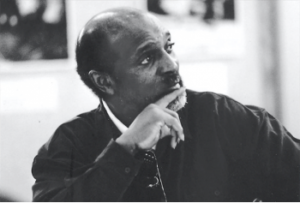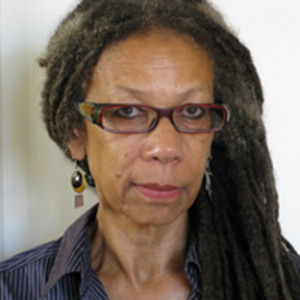It is thought that the term ‘racial capitalism’ was first used in a pamphlet published by the anti-Apartheid movement in London (Kundnani, 2020). Interestingly, Cedric J. Robinson was in England around this time working on his ground-breaking text, Black Marxism: The Making of the Black Radical Tradition (1983). During this period Robinson published several essays in Race & Class, the journal of the London-based Institute for Race Relation’s journal. Robinson would later join Ambalavaner Sivanandan and others on the journal’s editorial board.
 In a number of ways, Black Marxism is a dialogue with the Eurocentrism of Karl Marx and Marxism. In terms of the former, Robinson addresses Marx’s failure to adequately consider the importance and revolutionary potential of radical social movements outside of Europe. In terms of the latter, Robinson was of the view that Marxism had failed to adequately account for the racial nature of capitalism. Robinson also held the view that the idea of race and processes of racial differentiation were key components of how classed identities were imagined. Indeed, capitalism’s tendency towards fragmentation rather than homogenization is a key feature of Robinson’s theorization of racial capitalism.
In a number of ways, Black Marxism is a dialogue with the Eurocentrism of Karl Marx and Marxism. In terms of the former, Robinson addresses Marx’s failure to adequately consider the importance and revolutionary potential of radical social movements outside of Europe. In terms of the latter, Robinson was of the view that Marxism had failed to adequately account for the racial nature of capitalism. Robinson also held the view that the idea of race and processes of racial differentiation were key components of how classed identities were imagined. Indeed, capitalism’s tendency towards fragmentation rather than homogenization is a key feature of Robinson’s theorization of racial capitalism.
Central to Robinson’s thesis was the idea that different modes of production not only co-existed but that they were coterminous. So much so, Robinson maintained that the residue of different features of pre-capitalist society lived on in the capitalist system. Indeed, he argued that ‘racism is a means by which the relationship between these modes of production, and the associated differentiated labour, are coded, managed and legitimated’ (Kundnani, 2020)
Building on the sociological work of Oliver Cromwell Cox, Robinson rejected the notion that capitalism was a radical break with the feudal system. For Cox, capitalism had emerged from within feudalism and in concurrence with pre-existing forms of ‘racialism’ that had already been ensnared in Western feudal society. In his obituary of Cedric Robinson, Robin D. G. Kelley (2017) explains that, ‘capitalism and racism … did not break with the old order but rather evolved from it to produce a modern world system of racial capitalism dependent on slavery, violence, imperialism and genocide’. For Robinson, ‘capitalism was “racial” not because of some conspiracy to divide workers or justify slavery and dispossession, but because racialization had already permeated the Western feudal society’ (Kelley, 2017). For Robinson, ‘racialization within Europe was very much a colonial process involving invasion, settlement, expropriation, and racial hierarchy’ (Kelley, 2017).
In short, Robinson’s Black radical treatise looks beyond methodological nationalism, eurocentrism and the tendency to overemphasise European exceptionalism. By rejecting the idea that ‘early capitalism emerges in bounded national spaces’ (Bhattacharyya, 2018: 11), Robinson encourages us to think of the emergence of capitalism as ‘world system’. What is more, Robinson challenges the idea that ‘there is one and only one route for economic and societal development’ and that ‘there is no pre-determined political agent who holds the key to revolutionary change’ (Bhattacharyya, 2018: 11). In doing so, Robinson affirms the importance of the histories of African diaspora/s as an archive of anti-capitalist struggle.
Over the years, a number of scholars have built upon, and supplemented, Robinson’s thesis and the recent cries of ‘Black Lives Matter’ have reignited discussions over the nature of racial capitalism. In light of this, there are a couple of contributions that we might look towards to help us come to terms with the racialised nature of capitalism and capitalist social relations which touch on the racialised dimensions of (super-)exploitation, freedom and unfreedom, appropriation, theft and reparations, including the theft of land from Indigenous communities, and, processes and practises of criminalisation, surveillance, policing and terrorism
In 2015, Tithi Bhattacharya and Lance Selfa (2015a; 2015b) engaged Arun Kundnani and Deepa Kumar (2015) in a comradely and productive debate over the role played by the state in the evolution of racial capitalism. In short, this debate centres on the role of state repressive, coercive, ideological and consensual functions and the way in which the state might act in matters of capital-labour relations, often in opposition to the interests of the bourgeoise, without threatening capitalist accumulation. Another key feature of this debate relates to the complex and contradictory role that racialization has played in state policy-making and the making, unmaking and remaking of a multi-racial, multi-ethnic working class.
 Ruth Wilson Gilmore (2020) invites us to think about the ‘geographies of racial capitalism’ and specifically, the global dynamics of contemporary racial capitalism and how racism has inflected neoliberalism and austerity. Gilmore places emphasis on the way in which capitalism requires inequality and ‘racism enshrines it’. Not only this, Gilmore has gifted us a rich body of work on the prison industrial complex and the extension of criminalisation in the modern world. Focussing primarily on California in the mid-1970s and 1980s, Gilmore (2010) documents the exorbitant sums of money spent on the building of ‘prison, after prison, after prison, after prison’. For Gilmore, the prison industrial complex is one way in which economic elites go about getting what they want. Here Gilmore lays out the role that criminalization plays in facilitating this through the (re-)production of freedom and unfreedom and how this a historical legacy of slavery, genocide and the perpetuation racial order and hierarchy. In her book, Change Everything: Racial Capitalism and the Case for Abolition, Gilmore contends that abolitionism ‘does not just say no to police, prisons, border control, and the current punishment system’. It requires ‘persistent organizing for what we need, organizing that is already present in the efforts people cobble together to achieve access to schools, health care and housing, art and meaningful work, and freedom from violence and want’. In some ways, Gilmore echoes Malcolm X when arguing that racial practice and hierarchy cannot be undone with undoing capitalism.
Ruth Wilson Gilmore (2020) invites us to think about the ‘geographies of racial capitalism’ and specifically, the global dynamics of contemporary racial capitalism and how racism has inflected neoliberalism and austerity. Gilmore places emphasis on the way in which capitalism requires inequality and ‘racism enshrines it’. Not only this, Gilmore has gifted us a rich body of work on the prison industrial complex and the extension of criminalisation in the modern world. Focussing primarily on California in the mid-1970s and 1980s, Gilmore (2010) documents the exorbitant sums of money spent on the building of ‘prison, after prison, after prison, after prison’. For Gilmore, the prison industrial complex is one way in which economic elites go about getting what they want. Here Gilmore lays out the role that criminalization plays in facilitating this through the (re-)production of freedom and unfreedom and how this a historical legacy of slavery, genocide and the perpetuation racial order and hierarchy. In her book, Change Everything: Racial Capitalism and the Case for Abolition, Gilmore contends that abolitionism ‘does not just say no to police, prisons, border control, and the current punishment system’. It requires ‘persistent organizing for what we need, organizing that is already present in the efforts people cobble together to achieve access to schools, health care and housing, art and meaningful work, and freedom from violence and want’. In some ways, Gilmore echoes Malcolm X when arguing that racial practice and hierarchy cannot be undone with undoing capitalism.
 Robin D. G. Kelley, a leading historian in the United States, shares Gilmore’s interest in whether the abolitionist movement can radically transcend white supremacy and class domination. Deploying the concept of racial capitalism Kelley has spent much his career exploring, amongst many other things, the political dynamics of, and the role played by, radical social movements within African-American culture. Describing himself as a ‘Marxist surrealist feminist who is not just anti something but pro-emancipation, pro-liberation’, Kelley’s work endeavours to stretch Marxist grand narratives by documenting the ‘weaponization of racial capitalism’ throughout US history. Kelley also offers an intersectional perspective on what must be done, arguing that, ‘a truly, fundamental abolitionist future requires that they all [i.e. racism, classism, heteropatriarchy and ableism] be held together’.
Robin D. G. Kelley, a leading historian in the United States, shares Gilmore’s interest in whether the abolitionist movement can radically transcend white supremacy and class domination. Deploying the concept of racial capitalism Kelley has spent much his career exploring, amongst many other things, the political dynamics of, and the role played by, radical social movements within African-American culture. Describing himself as a ‘Marxist surrealist feminist who is not just anti something but pro-emancipation, pro-liberation’, Kelley’s work endeavours to stretch Marxist grand narratives by documenting the ‘weaponization of racial capitalism’ throughout US history. Kelley also offers an intersectional perspective on what must be done, arguing that, ‘a truly, fundamental abolitionist future requires that they all [i.e. racism, classism, heteropatriarchy and ableism] be held together’.
 In conclusion, if we are to adequately grasp the nature of racism and capitalism, both historically and at this particularly moment, while imagining a radical alternative future, we would do well to remember Gargi Bhattacharyya’s (2018) ‘Ten Theses on Racial Capitalism’. For Bhattacharyya; (1) racial capitalism ‘is not a way of understanding capitalism as a racist conspiracy or racism as a capitalist conspiracy’; (2) Feminist debates can help us reconsider the role played by ‘non-work’ as part of an expanded conceptualisation of social reproduction’; (3) ‘racism had a distinct history that precedes capitalism’; (4) Racial capitalism combines both the ‘exercise of coercive power and the mobilisation of desire’; (5) ‘new and unpredictable modes of oppression must be understood’; (6) we must grasp ‘how people are divided from each other in the name of economic survival or in the name of economic well-being’; (7) racial capitalism ‘describes a set of techniques and a formation, and in both registers the disciplining and ordering of bodies through gender and sexuality and dis/ability and age flow’; (8) Racial capitalism is ‘intimately intertwined with the processes precipitating ecological crisis’; (9) ‘Dehumanization seems to be an unavoidable outcome of the processes of capitalist development’; and, (10) Racial capitalism is a way of understanding why we seem to be so divided and yet so intimately intertwined with each other’ (2018: ix)
In conclusion, if we are to adequately grasp the nature of racism and capitalism, both historically and at this particularly moment, while imagining a radical alternative future, we would do well to remember Gargi Bhattacharyya’s (2018) ‘Ten Theses on Racial Capitalism’. For Bhattacharyya; (1) racial capitalism ‘is not a way of understanding capitalism as a racist conspiracy or racism as a capitalist conspiracy’; (2) Feminist debates can help us reconsider the role played by ‘non-work’ as part of an expanded conceptualisation of social reproduction’; (3) ‘racism had a distinct history that precedes capitalism’; (4) Racial capitalism combines both the ‘exercise of coercive power and the mobilisation of desire’; (5) ‘new and unpredictable modes of oppression must be understood’; (6) we must grasp ‘how people are divided from each other in the name of economic survival or in the name of economic well-being’; (7) racial capitalism ‘describes a set of techniques and a formation, and in both registers the disciplining and ordering of bodies through gender and sexuality and dis/ability and age flow’; (8) Racial capitalism is ‘intimately intertwined with the processes precipitating ecological crisis’; (9) ‘Dehumanization seems to be an unavoidable outcome of the processes of capitalist development’; and, (10) Racial capitalism is a way of understanding why we seem to be so divided and yet so intimately intertwined with each other’ (2018: ix)
Readings:
Bhattacharyya, G. (2018) Racial Capitalism: Questions of Reproduction and Survival. London: Rowman & Littlefield.
Robinson, C. J. (1983) Black Marxism: The Making of The Black Radical Tradition. London: University of North Carolina Press.
Robinson, C. J. (2 October 2019). Quan, H. L. T. (ed.). Cedric J. Robinson: On Racial Capitalism, Black Internationalism, and Cultures of Resistance. Pluto Press.
Further Readings & Resources:
Basu, L. and Stuart, F. ‘Is capitalism racist?’, Open Democracy – podcast.
Bhattacharya, T. & Selfa, L. (2015a) ‘“Race, surveillance, and empire”: A commentary’, Internationalist Socialist Review, Issue 97.
Bhattacharya, T. & Selfa, L. (2015b) ‘Race, class, and capitalism: A response to a response’, Internationalist Socialist Review, Issue 98.
Burden-Stelly, C. (2020) ‘Modern U.S. Racial Capitalism: Some Theoretical Insights’, Monthly Review: An Independent Socialist Magazine.
Gilmore, R. W. (2020) ‘Geographies of Racial Capitalism’, An Antipode Foundation film – video
Kelley, R. D. G. (2017) ‘What is Racial Capitalism and Why Does It Matter?’, recorded at the Kane Hall, University of Washington, Seattle, WA – Video
Kelley, R. D. G. and Shamsi, H. (2020) ‘The Rebellion Against Racial Capitalism’, The Intercept – podcast.
Kundnani, A. (2020) ‘What is racial capitalism?’, Arun Kundnani on race, culture and empire. https://www.kundnani.org/.
Kundnani, A. & Kumar, D. (2015) ‘Race, surveillance, and empire’, Internationalist Socialist Review, Issue 96.
Questions:
How did Cedric J. Robinson define racial capitalism?
In what ways do different theorizations of racial capitalism seek to stretch Marxism?
What are the key points of debate between Arun Kundnani and Deepa Kumar, and Tithi Bhattacharya and Lance Selfa on the relationship between racism and capitalism?
What does Ruth Wilson Gilmore mean by ‘Capitalism requires inequality, racism enshrines it’?
Discuss Robin D. G. Kelley’s vision of ‘a fundamental abolitionist future’.
Consider the different ways in which the concept of racial capitalism has been used in the context of the Black Lives Matter uprisings?
Discuss Gargi Bhattacharyya’s ten theses on racial capitalism?
Submitted by Stephen D. Ashe
Images: Cedric Robinson (Boston Review); Ruth Wilson Gilmore (City University of New York); Robin D. G. Kelley (UCLA); Gargi Bhattacharyya (Open Democracy).
7 thoughts on “Zapatismo”